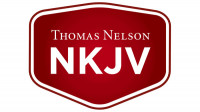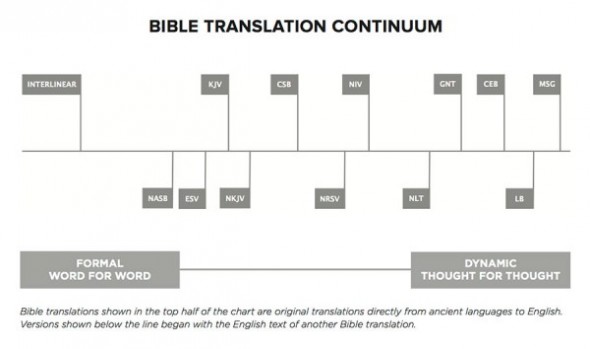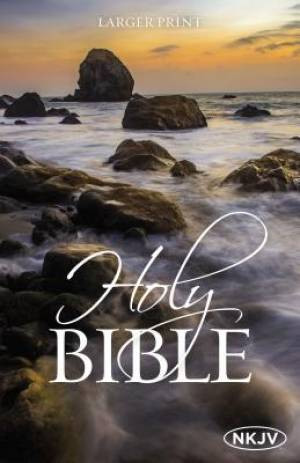What is the New King James Version (NKJV) Bible?
Aaron Lewendon - Eden Bibles & Bible Study Specialist
Finding the right Bible isn’t easy. There are dozens of translations and hundreds of editions to choose from. Our new series of guides is here to answer your questions about the different Bibles on offer today.

In short, it’s the King James Bible, but new.
The New King James Version (NKJV) Bible takes as its foundation the classic King James Bible from 1611 but gives it a more modern feel. The goal of the NKJV is simple: to preserve the beauty of the KJV whilst making it accessible to modern readers.
Put succinctly, the Bible’s strapline is “Beautiful. Trustworthy. True.”
History of the NKJV
For the classic King James Bible, the thing readers most love and struggle with is the same: the language.
That’s because the KJV’s language is far removed from how we speak today (for example, the word ‘awful’ in Old English used to mean full-of-awe, but now describes something that is generally terrible - often the weather). The KJV was written with such literary finesse that its very intricacy became the translation’s crowning jewel for many readers. The need was firmly in place for a Bible which kept the beauty but improved the relevance. That need was met 371 years after the KJV’s completion, across the Atlantic Ocean, by an American Publisher with a team of 130 scholars and theologians primed for the task ahead.
You can read all about how the King James Bible was created here. But, in short, the KJV was made as a Bible which a non-Latin-speaking populace living in the 17th century could read. A bible which removed barriers to being read.
And now back to the NKJV.
The story of the NKJV began seven years before its eventual publication.
It was 1975. The New International Version (NIV) had recently published its New Testament translation. As the number of modern language Bibles steadily grew, so too did the number of Christians who turned to them. Moving in the opposite direction, the classic King James Bible was becoming the preferred Bible of choice for scholars and historians. Academics who turned over every word for inspection and analysis.
This was perceived as a relegation of sorts. Considering the KJV's previously-held status as the essential Bible for English speaking Christians, it deserved a second wind. A way to once again shine in the wider world.
Amidst the influx of contemporary Bibles, Arthur Farstad was moved to create an update to the King James Bible. One that spoke to readers but maintained the sheen of rich writing.

As an editor at the Christian publishing house Thomas Nelson, Arthur Farstad was perfectly placed to assemble the team for the job. A team that would continue the legacy of the KJV through treating the NKJV not as a wholly-new Bible, but simply as an update to an already brilliant translation. Amongst that 130-strong team of scholars, leaders and theologians were Christian laities to help ground the translation.
It took four years to create and translate the New Testament, with a full Bible edition coming three years later in 1982. Seven years in total were spent bringing the King James Bible into the 20th Century.
How Was It Translated?
As the NKJV is a revision of the King James Bible, here’s a quick primer of how the original came into being.
Very few English language Bibles existed in the 1600s. If you didn’t speak Latin or Greek, then your chances of reading the Bible for yourself were almost non-existent. This also meant the KJV did not have a wealth of contemporary English Language sources to draw from. The few English language Bibles that did exist often remained on the pulpit. Amongst those English Bibles were the Great Bible, the Geneva Bible, and the Bishop’s Bible; the latter being the primary influence for the KJV as it was produced, under the Church of England a little over 50 years beforehand. All passages in the Bishop’s Bible that were deemed problematic at the time were changed for the KJV, but names of places and people remained unaltered.
The Bishop’s Bible drew a great deal from the original Greek, Aramaic and Hebrew texts. These texts included the Hebrew Masoretic Texts (the closeness to which also set the KJV apart from other Bibles) and Beza's Greek New Testament.
The King James Bible was a rich Bible for the masses.
The team selected to create the NKJV aimed to continue the translation philosophy of the KJV. A philosophy called complete equivalence. In short, complete equivalence makes sure translators of the original scriptures always find the closest modern equivalent in English. This includes swapping out some of more dated pronouns that have fallen out of use. Thou is now you, thine is now yours.
How Accurate is the NKJV?
But how accurate is the NKJV, really?
Before answering, it helps to know two key terms used when discussing how accurate a Bible is. Whenever anyone discusses Translation accuracy, they will most likely draw a line in the sand between Bibles that are “word-for-word” and Bibles that are “thought-for-thought”.
Word-for-word Bibles present as directly as possible the text in the original scriptures. As the scriptures come from a culture far removed from our own, their texts are harder to understand and so any direct translations themselves will require of the reader a sharp eye and working knowledge of the context from which the Bible came.
Thought-for-thought Bibles operate under a different approach. They employ a greater level of textual interpretation throughout their translation process. This includes taking in wider contexts and meanings as a guide to what the original text meant and how that text would look in today’s language.
If word-for-word is akin to Google Translate, operating with as little human interpretation as possible, then thought-for-thought is like a poem translated from another language, where meaning and form carry greater emphasis.
But where does the NKJV Bible sit on this spectrum?
As mentioned, the translation used complete equivalence as its guide for translation. This means that as often as possible, the direct word choices are lifted straight from the original scriptures.
It is definitely a word-for-word Bible.

How easy is the NKJV to read?
Because of its modern and updated language, the NKJV Bible is written at a 7th Grade Reading Level. This means readers from the ages of 12 and up should confidently be able to read the NKJV text and understand it.
What determines this level is a score that takes into account the total number of unique words and sentences, as well as sentence length and the length of the words themselves. It doesn’t take into account any understanding of history or context, just the words and grammar of the text.
As an example, this sentence you are currently reading would score at a Grade Nine on the readability test.
This sentence would be at Grade Two.
Common Uses
As the NKJV is part of the legacy of the King James Bible, it carries with it a great amount of trust and history for Christians. In 2012 it was the third most popular Bible, coming just on the heels of the NIV and the NKJV's predecessor, the KJV.
Due to its accuracy and readability, a wide segment of Christianity has embraced the New King James Bible. Churches use it for services, scholars for deep textual investigation, and individuals for personal reading.
For a time, even the Gideons picked the NKJV as their translation of choice, leaving it in hotels and hospitals whenever a newer Bible version was requested.
Different Editions
To date, there have been no revisions of the NKJV Bible.
Since its release in 1982, the New King James Version of the Bible has remained the same, but some editions feature footnotes indicating textual variations in the original sources.
Example Verses From the NKJV Bible:
For God so loved the world that He gave His only begotten Son, that whoever believes in Him should not perish but have everlasting life. - John 3:16
For I know the thoughts that I think toward you, says the Lord, thoughts of peace and not of evil, to give you a future and a hope. - Jeremiah 29:11
And be kind to one another, tenderhearted, forgiving one another, even as God in Christ forgave you. - Ephesians 4:32
Versions You Can Buy
NKJV Larger Print Paperback

Want to give the NKJV a try at a low cost? Although made for outreach, the Economy Bible is actually a great way to try out a Bible for yourself. A way to see if the transaction is a good fit. Then you can hunt for an NKJV that is tailored to what you’re looking for in a Bible.
This edition also features large print text that makes reading even more accessible.
NKJV Life Application Study Bible
As the NKJV is as suited to personal reading as it is deeper study, it's an ideal candidate for the Life Application genre of study Bibles. This edition contains over 10,000 Life Application Notes that help readers apply the truths of God's Word to everyday life.
NKJV Gift and Award Bible
A great way to help someone find out more about faith the NKJV offers the reassurance of presenting someone with a Bible that is both reliable and readable. This imitation leather edition is available in black, brown, purple, and pink. The affordably priced NKJV Gift & Award Bible is a well-designed Bible for special occasions.
NKJV, Journal the Word Bible
Journaling Bibles are currently the big trend in Bibles. With thicker paper and wider margins, the unique mix of a notebook and a Bible means your own notes don't have to be crammed into the edges of the page anymore. With the Journal the Word Bible you have space to freely reflect and write.
Frequently asked questions
Is the New King James Version a Catholic Bible?
No. The NKJV is an update of the King James Bible, which was commissioned as a Protestant Bible by a Protestant monarch.
Is the New King James Version easy to read?
The NKJV scores a reading grade of 7, meaning people from the ages of 12 and up should be able to read it.
How many words are in the NKJV Bible?
There are 770,430 words in the New King James Version of the Bible.
Is the NKJV Bible a translation or a paraphrase?
A translation sticks as closely as possible to the words used in the original text. A paraphrase seeks to carry over the meaning rather than the direct word choice.
The NKJV is a translation as it uses closely equivalent words throughout.
Other Bible Translations:
Click on any of the images below to learn all about the stories behind some of the world's most widely-read Bible translations.






.jpg)
Latest Blogs

Bibles
Minecraft Bible for Kids: Faith Meets Fun After the Hit Movie
Now that they've seen The Minecraft Movie, now’s the perfect time to hand kids a Bible they won’t want to put down.

Bible Verse
Bible Verses About Peace
Read Bible Verses About Peace and discover how the Bible still speaks today.

Bibles
Gen Z and the Rise of Catholic Faith: Bible Trends to Watch
When it comes to church, Gen Z isn’t walking away—they’re walking somewhere unexpected.

Children's bibles
What is a Storybook Bible?
A storybook Bible is a children's book that presents narratives from the Bible in a simplified and engaging manner, tailored for young readers. These books combine vivid storytelling with colorful illustrations to make the teachings of the Bible accessible and captivating for children.

Bible
What is the New International Version (NIV) Bible?
Finding the right Bible isn’t easy. There are dozens of translations and hundreds of editions to choose from. Our new series of guides is here to answer your questions about the different Bibles on offer today.

Bible
What is the New Living Translation (NLT) Bible?
Finding the right Bible isn’t easy. There are dozens of translations and hundreds of editions to choose from. Our new series of guides is here to answer your questions about the different Bibles on offer today.
